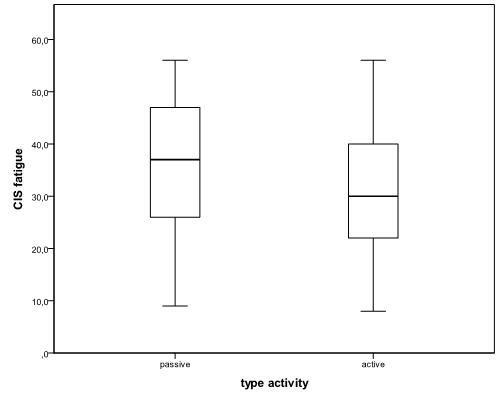Session Information
Title: Rheumatoid Arthritis - Clinical Aspects II: Clinical Features & Comorbidity/Cardiovascular Disease
Session Type: Abstract Submissions (ACR)
Background/Purpose:
Fatigue in rheumatoid arthritis (RA) is related to pain and disability, and several psycho-social factors such as coping strategies. In Chronic Fatigue Syndrome (CFS), increased fatigue is associated with reduced physical activity. Apparently, cognitive behavioral therapy and exercise are the only effective interventions in CFS. It is unclear whether, also in RA, fatigue and physical activity are related. Therefore, the objective of this study was to investigate whether there is an association between objectively measured physical activity and patient assessed fatigue in RA patients.
Methods:
Consecutive RA patients of the rheumatology clinic of the Radboud University Nijmegen Medical Centre (N=181) were enrolled. Fatigue severity was measured using the fatigue severity subscale (CIS-fatigue) of the Checklist Individual Strength (CIS20). Physical activity was measured during 12 consecutive days with an ankle-worn actometer and a daily activity score was calculated from the number of accelerations. The group mean of the physical activity score over the 12-day period acted as predefined reference score. All patients with at least 10 daily measurements of activity were included in the analyses. Patients with at least 90% of their daily activity scores below the group mean were classified as pervasively passive, while the remaining patients were labeled as active. Linear regression was performed with CIS-fatigue as dependent and physical activity as independent variable with correction for confounders. Fatigue was also analyzed classified as severely fatigued (CIS-fatigue score ≥ 35) and not severely fatigued (CIS-fatigue score < 35).
Results:
A total of 167 patients had at least 10 daily measurements of activity and were included in the analysis. Mean activity score (±SD) of all 167 patients was 73±27, and 42 (25%) patients were classified as pervasively passive and 125 (75%) patients were classified as active. Active patients showed less fatigue: the mean (±SD) CIS-fatigue was 30.9 (12.3) in active patients and 35.7 (12.8) in pervasively passive patients (p=0.028). Similarly, there was a significantly higher percentage of severely fatigued patients in the passive group (60%) compared to the active group (38%), (p=0.017). The relation between activity and fatigue was linear (β= -0.077) and significant (p=0.012), with correction for the confounders age, gender and pain.
Conclusion:
In RA, a higher level of physical activity was associated with less fatigue. Active patients had a significantly lower CIS-fatigue score than the pervasively passive patients. To study whether this relationship is causal and clinically relevant, an intervention trial aiming at increasing activity may be performed.
Figure 1. Box plots: bold horizontal bars indicates the medians, the end of the boxes indicates the quartiles.
Disclosure:
S. van Dartel,
None;
H. Repping-Wuts,
None;
D. van Hoogmoed,
None;
H. Knoop,
None;
G. Bleijenberg,
None;
P. L. C. van Riel,
None;
J. Fransen,
None.
« Back to 2012 ACR/ARHP Annual Meeting
ACR Meeting Abstracts - https://acrabstracts.org/abstract/association-of-actometer-assessed-physical-activity-and-fatigue-in-patients-with-rheumatoid-arthritis-patients-with-a-lower-daily-activity-have-more-fatigue/

